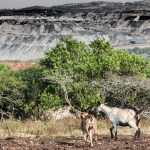WARRIOR WOMEN
Women Warriors are spearheading the climate justice movement in South Africa

Not only are women and girls living in vulnerable areas disproportionately affected by worsening droughts, fires, food insecurity and other climate change impacts, but they are also leading the battle against threats to their natural environment and livelihoods – and are going head to head with the powers that be.
This Women’s Month, during a Women Warrior webinar hosted by the Green Connection on 15 August, bold and fierce women shared the importance of leaning on each other and working together to advocate for projects that safeguard the environment and livelihoods and contribute to local socioeconomic development.
Liz McDaid from the Green Connection, Nonhle Mbuthuma from the Amadiba Crisis Committee, Melissa Groenink from Natural Justice and Wendy Pekeur from the Rural Women’s Assembly discussed the role played by women in stopping the R1-trillion nuclear deal in 2017, as well as interdicting Shell’s seismic surveys on the Wild Coast and creating awareness across the country about the risks of Karpowership while exposing the negative impacts of these ventures on communities.
It has been well documented that women are more vulnerable to the impacts of climate change due to social, economic and cultural factors. But women are refusing to sit on the sidelines while their livelihoods and natural environment are threatened by increased oil, gas and mining applications in their communities across South Africa.
Finding your voice in climate activism
It’s hard to imagine the powerhouse that is Liz McDaid – who was instrumental in civil society groupings that stopped the South African government’s secret nuclear deal with Russia in 2017 – not being able to share her thoughts and voice, but in urging women to find their voices, McDaid shared how difficult it was when she was younger to speak up for environmental justice.
Read more in Daily Maverick: How the climate crisis disproportionately affects women
Now, McDaid’s voice is heard across the country driving a campaign to protect oceans, ensure that livelihoods depending on a healthy ocean are secured, and oppose offshore oil and gas exploration as well as other energy options that exacerbate climate change.
“My message to all women and all activists is to find your voice and deliver your message to whoever it is (aimed at) and deliver this with emotion. It’s an emotional issue. We are emotional beings. We are human beings, not machines.
“So, despite the incredible hardships and suffering that people are experiencing at the hands of corporations, you need to stand back and strategically use your emotions to be strong in the face of these struggles to advocate for change.”
To achieve eco-justice, McDaid said women and communities must stand together for what they believe in – especially with the onslaught of mining applications that could detrimentally affect the protection of coastal communities, livelihoods and the environment.
In acting for future generations, McDaid said they had to remind politicians that they needed to make decisions and plans for the future that prioritised people, not economic interests.
From the Ubuntu Rural Women and Youth Movement, Wendy Pekeur is a feminist and gender activist with experience in land activism and labour rights in the Western Cape, advocating for women’s empowerment and the improvement of women’s living and working conditions in rural communities.
In this movement, Pekeur said they mobilised women in rural communities across the country and educated them about what was going on around them and how they could bring about change in their areas and safeguard their communities from big corporations that plundered their resources, leaving devastation in their wake.
“We went to the West Coast where there’s an onslaught of applications to mine in the oceans, which provide the livelihood of fishing communities and play a very vital role in terms of providing food security to millions of people. The oceans are also a part of the heritage and identity of indigenous fishing communities, who have been loving the oceans for many years.”
In all the areas they have been, Pekeur says women have taken ownership to ensure their communities are aware of what their rights are, “because women are agents of change and should lead change in their own lives”.
“When somebody comes into my farming community, we know what life is like here in Elsenburg. We resisted lots of things that had been happening in our community, and we took charge of our lives in Elsenburg. We are seeing the same thing happening in fishing communities in Port Nolloth, Hondeklip Bay.”
Pekeur said corporations were building their empires on minerals from South Africa that should belong to and benefit indigenous communities who were left in the dust after their activities.
“I agree that women need to find their voice. Women have voices, but a lot of times when we come to the West Coast, we find they have been silenced – even by community men.”
Pekeur said this was why her movement primarily focused on working with women, so they could start leading and taking charge of their lives by challenging what was happening within their communities.
Nonhle Mbuthuma is a social and environmental activist from the Amadiba Crisis Committee, working on protecting vulnerable communities and the coastal area around Amadiba in the Eastern Cape.
Her work focuses on advocating against open-cast mining on the Wild Coast and empowering the Amadiba community to be aware of South African laws and to ensure the laws work for them.
“The voice of women is very important, but for it to be heard, you need to push. I see this myself, coming from the rural parts of South Africa where we are under traditional leadership. I call on all women to not doubt themselves and to push while making sure that we mobilise other women to build the future that we want, that our next generation will be proud of.”
If women don’t take up this call, Mbuthuma says climate change and global warming will continue to threaten this future.
Women litigating for environmental justice
Another woman driving eco-justice is Melissa Groenink, an attorney specialising in environmental and planning law at Natural Justice. Groenink works with communities to defend their rights and protect them from environmental and social impacts. She was recently involved in court cases against the exploration of both the Shell and Searcher Seismic surveys.
The judgment delivered in September 2022 was a resounding victory for the social and environmental justice values of the applicants – Wild Coast communities, Sustaining the Wild Coast, All Rise, Natural Justice and Greenpeace Africa. However, the Shell case is still before the Supreme Court of Appeal.
Read more in Daily Maverick: Activists celebrate big win for Wild Coast against Mantashe and Shell
In the meantime, Shell remains interdicted from carrying out its seismic survey as the September judgment found the company’s application did not undertake an environmental impact assessment or obtain environmental authorisation in terms of the National Environmental Management Act before it began the survey.
Reflecting on the Shell and Searcher Seismic cases, Groenink said: “There is no way, when we think about our climate and environmental justice goals, that one organisation or one person can achieve those alone. So collaboration is key… we are stronger together.”
Groenink reiterated that communities were at the forefront of the climate struggle and that their voices should be the loudest.
“While we are organisations working in this space, we stand with communities and have to make sure that those community voices are the loudest, as they are the most impacted by the change in our climate.” DM



















 Become an Insider
Become an Insider
Comments - Please login in order to comment.